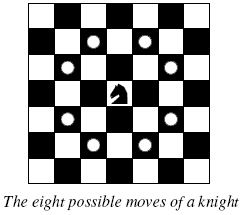原题链接:http://poj.org/problem?id=2488
我的链接:http://acm.hust.edu.cn/vjudge/contest/view.action?cid=19651#problem/A
A Knight's Journey
| Time Limit: 1000MS | Memory Limit: 65536K | |
| Total Submissions: 23452 | Accepted: 7944 |
Description
 Background
Background The knight is getting bored of seeing the same black and white squares again and again and has decided to make a journey
around the world. Whenever a knight moves, it is two squares in one direction and one square perpendicular to this. The world of a knight is the chessboard he is living on. Our knight lives on a chessboard that has a smaller area than a regular 8 * 8 board, but it is still rectangular. Can you help this adventurous knight to make travel plans?
Problem
Find a path such that the knight visits every square once. The knight can start and end on any square of the board.
Input
The input begins with a positive integer n in the first line. The following lines contain n test cases. Each test case consists of a single line with two positive integers p and q, such that 1 <= p * q <= 26. This represents a p * q chessboard, where p describes
how many different square numbers 1, . . . , p exist, q describes how many different square letters exist. These are the first q letters of the Latin alphabet: A, . . .
Output
The output for every scenario begins with a line containing "Scenario #i:", where i is the number of the scenario starting at 1. Then print a single line containing the lexicographically first path that visits all squares of the chessboard with knight moves
followed by an empty line. The path should be given on a single line by concatenating the names of the visited squares. Each square name consists of a capital letter followed by a number.
If no such path exist, you should output impossible on a single line.
If no such path exist, you should output impossible on a single line.
Sample Input
3 1 1 2 3 4 3
Sample Output
Scenario #1: A1 Scenario #2: impossible Scenario #3: A1B3C1A2B4C2A3B1C3A4B2C4
Source
TUD Programming Contest 2005, Darmstadt, Germany
算法:DFS + 回溯
题意:骑士周游列国问题,说白了就是任一给你一个棋盘(当然满足格子数小于26)
让你从第一个格子按照图中所给的马走日的步法
不重复遍历走完整个棋盘。然后按照字典序输出路径即可
思路:按照图中的八个方向dfs即可。
注意: 1.回溯的用法,千万别忘了还原状态。
2.路径的输出,字典序的是列。。。
//Accepted 172 KB 16 ms C++ 1191 B 2013-03-02 21:12:01
#include<cstdio>
#include<cstring>
const int maxn = 30;
int w[maxn*maxn][2]; //存储路径
bool vis[maxn][maxn];
int dir[8][2] = {-2,-1, -2,1, -1,-2, -1,2, 1,-2, 1,2, 2,-1, 2,1};
int p,q;
int n;
int sum;
bool search(int row, int col)
{
sum++;
w[sum][0] = row; w[sum][1] = col;
if(sum == n) return true;
else for(int i = 0; i < 8; i++)
{
int next_r = row + dir[i][0];
int next_c = col + dir[i][1];
if(next_r >= 1 && next_r <= q && next_c >= 1 && next_c <= p && !vis[next_r][next_c])
{ //注意行和列的范围
vis[next_r][next_c] = true;
if(search(next_r, next_c)) return true; //
vis[next_r][next_c] = false;
sum--; //注意点 开始WA了好久
}
}
return false;
}
int main()
{
int T;
scanf("%d", &T);
for(int test = 1; test <= T; test++)
{
bool result = false;
scanf("%d%d", &p, &q);
n = p*q; sum = 0;
if(n >= 1 && n <= 26)
{
memset(w,0,sizeof(w));
memset(vis,false,sizeof(vis));
vis[1][1] = true;
result = search(1,1);
printf("Scenario #%d:\n", test);
if(result)
{
for(int i = 1; i <= n; i++)
printf("%c%d", w[i][0]+'A'-1, w[i][1]);
printf("\n");
}
else
{
printf("impossible\n");
}
if(test != T) printf("\n"); //注意格式
}
}
return 0;
}